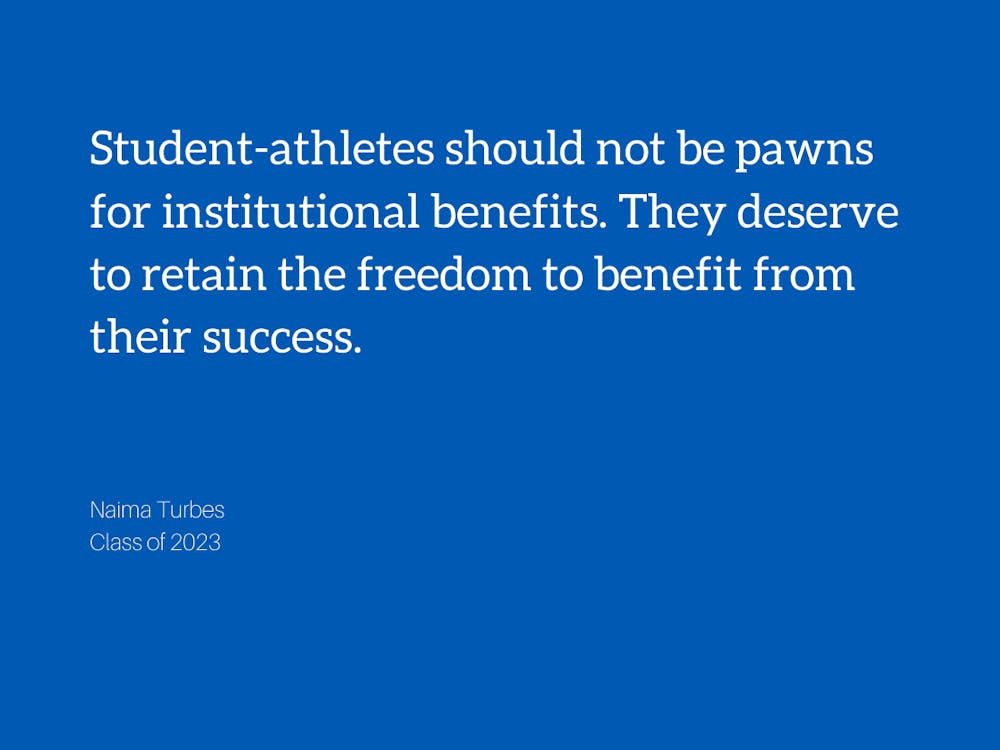Imagine if during his time at Duke, Zion Williamson could sell his own shoes. I, along with the tens of thousands of crazed Duke fans, would buy and proudly wear them. Without signing any professional team contracts and remaining a Duke student, Zion would have millions of dollars to his name.
The NCAA’s recent decision allowing athletes to profit from their name, image, and likeness might make this scenario possible in the future. The ruling is a result of pressure from a California law “Fair Play, Fair Pay” passed earlier this year that gave NCAA athletes in the state the same freedoms. Changes to the policy will go into effect by January 2021 after each sports division discusses and develops more specific rules.
Despite the lack of clarity concerning how athletes might benefit, the ruling’s message is clear. Student-athletes should not be pawns for institutional benefits. They deserve to retain the freedom to benefit from their success.
To say that I was shocked at the NCAA’s decision would be an understatement. The NCAA notoriously uses its power to give athletes’ incoming money and fame to their respective institutions. Under previous NCAA amateurism rules, schools benefited at the expense of athletes. Too often, the institutions win. If anything, I thought that the NCAA would oppose down the rule in California.
Maybe that is why I am excited about the new rule and conversations about athlete freedoms. Maybe college athletics will see more money in the hands of players. Maybe more successful athletes will finish school.
From a gender equality standpoint, some might argue that the rule favors men’s basketball and football. While I do not doubt the greater attention and profit available in those sports, allowing female athletes to profit from their likeness is a bigger deal.
Former UCLA gymnast Kaitlyn Ohashi affirms this idea in her endorsement of the changes.
“From experience, allowing... women or Olympic-sport athletes, who... are staying and graduating from NCAA institutions to take advantage of unexpected moments like I had empowers us to help finally earn what we deserve,” said Ohashi.
Her words made me think of all the female athletes at the peak of their career while college age. Athletes with the opportunity to compete at the professional level while college age – such as Simone Biles, Aly Raisman, or Venus Williams – cannot simultaneously receive money and play college sports. Many women are at the top of their sport in terms of success and fame during their college years. Compared to men’s sports, money in women’s professional sports might as well be pennies in a bucket. Arguably, college represents the best time for female athletes to profit.
There are, however, a variety of potential problems with allowing athletes to profit from their names. This is particularly true in women’s sports, where social media platforms like Instagram, can promote an oversexualization of female athletes.
Sports resembles a meritocracy in that wins and losses measure success. . Thus, using female athletes’ body image in college as a means of income is frustrating. Is more attention to and money in female college athletics worth potential objectification?
In my conversations with Duke athletes about the ramifications of the ruling, the divide in takeaways was stark. Football players expressed excitement over the ability to make money.
“Wait for me to develop my Instagram platform” said football player Dewayne Carter. “I am about to bring in the cash.”
On the other hand, players in sports like tennis, field hockey, and track and field almost dismissed the ruling, arguing that it had no significant impact on “minor” sports.
“I guess the new rule is good, but at the end of the day, this rule is for men’s football and basketball” said tennis player Chloe Beck.
As a track and field athlete, I have no intention of profiting from my name or image while at Duke. The feasibility of making money from my sport in college is so small, especially compared to money in campus jobs or summer opportunities. At the same time, I cannot dismiss the impact and importance of such a rule simply because I have little stake. I am eager to see people like Skylar Diggins or Kaitlin Ohashai in years to come earn money from what is essentially a job. This rule was not meant to disempower institutions but to give athletes more freedom.
Before we all get too excited, new ruling raises more questions than anyone can answer at this point. What if Zion could have become a millionaire at Duke? Would he have stayed?
I find that people often avoid the conversation about money in sports. My challenge to the NCAA and leaders in this effort is to allow the change in ruling create open dialogue for how money in college athletics can be ethically earned and distributed.
Naima Turbes is a Trinity first-year. Her column, “mind over matter,” typically runs on alternate Tuesdays.
Get The Chronicle straight to your inbox
Signup for our weekly newsletter. Cancel at any time.

